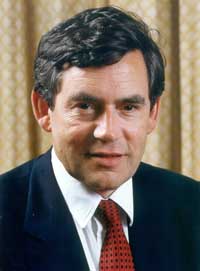Britain's new prime minister to name Cabinet team
Britain's new leader Gordon Brown will appoint his senior circle of ministers Thursday after he ended a decade-long wait to become prime minister, stepping from Tony Blair's shadow determined to repair divisions over the unpopular Iraq war.

Brown, a 56-year-old Scotsman, planned a host of changes from Blair's final team, bringing a crop of young legislators into his government.
He was also looking beyond his Labour ranks - much like French President Nicolas Sarkozy - to offer roles to opposition legislators and leading business figures.
"I will build a government that uses all the talents," Brown told reporters outside his Downing Street office. "I will invite men and women of good will to contribute their energies in a new spirit of public service."
Advances to ex-opposition Liberal Democrat leader Paddy Ashdown and former London police chief John Stevens were rebuffed, but officials said Brown would spring surprises with his new team.
Several senior ministers close to Blair - including law and order chief John Reid and Attorney General Lord Peter Goldsmith - have already tendered their resignations.
Britain changed its leadership for the first time in a decade with Queen Elizabeth II's formal confirmation of Brown as leader Wednesday.
Britain also has will have a new Treasury chief for the first time since 1997. Another Scotsman is widely tipped for the role - Alistair Darling, the current trade and industry secretary.
Foreign Secretary Margaret Beckett was widely expected to be moved from her post as chief diplomat. A leading contender to replace Beckett is David Miliband, the environment chief.
Health Secretary Patricia Hewitt also resigned, but there was little speculation about a likely choice for her job.
Brown's spokesman Michael Ellam declined to comment in advance of a full announcement.
Blair departed Wednesday to rousing applause and tears from lawmakers. He said he was sorry for the perils faced by British troops in Iraq and Afghanistan, but gave no apology for his decisions to back the United States in taking military action.
"I wish everyone - friend or foe - well," Blair said before departing the chamber to cheers. "And that is that. The end."
Blair later took a train to northern England - carrying his own luggage - where he told officials in the town he represented in Parliament he would resign as a British legislator.
He takes on a daunting role as envoy to the Quartet of Mideast peace mediators after presiding over a decade of rapid social change - and rancor at the Iraq invasion.
Having departed the Treasury for Buckingham Palace in a modest car with wife Sarah, Brown swept back to Downing Street in a government limousine.
"I remember words that have stayed with me since my childhood and which matter a great deal today - my school motto - 'I will try my utmost'," Brown told reporters.
U.S. President George W. Bush was the first world leader to offer his congratulations in a phone call soon after Brown's appointment, Downing Street said.
Their 10-minute talk was "cordial and constructive," Ellam said, declining to specify if the leaders discussed Iraq.
Brown also held brief telephone chats with the leaders of France, Ireland, Germany and Italy.
In London, Brown continued discussions to map out his legislative agenda, seeking to head off the challenge from a revived opposition Conservative party. Polls already point to a "Brown bounce," with one survey putting his Labour party ahead of its rivals for the first time since October.
Most closely watched will be Brown's policy toward Iraq. British troop numbers there have rapidly fallen during 2007.
Blair left his successor an option to call back more of the remaining 5,500 personnel by 2008 - an opportunity likely to be grasped by a leader with a national election to call before June 2010. Brown confirmed Wednesday number will soon fall to 5,000.
The succession of Brown ended a partnership at the pinnacle of British politics that began when he and Blair were elected to Parliament in 1983 - sharing an office and a vision to transform their party's fortunes.
Subscribe to Pravda.Ru Telegram channel, Facebook, RSS!


